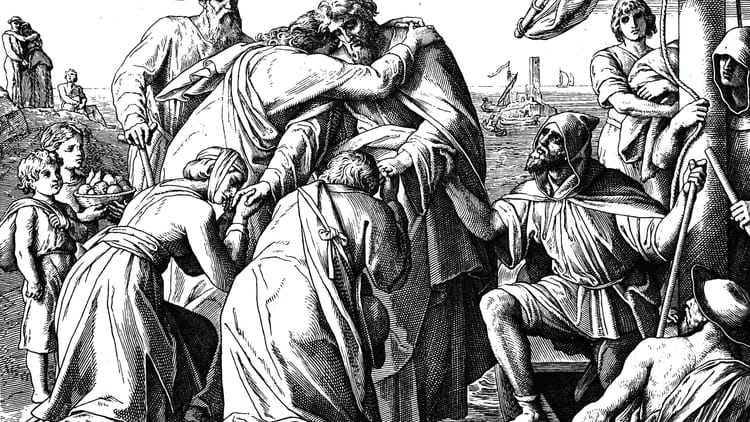Empowering Each Individual (Acts 18:24-28)

Big Idea: God calls believers to empower others by recognizing their spiritual gifts and fostering growth.
I'd like you to open a passage of Scripture with me this morning. It's found in Acts 18. The setting is Ephesus – the capital city of the Roman province of Asia, with over 300,000 inhabitants. It was Asia's most important commercial center. It had a large harbor and the Temple of Diana, one of the seven wonders of the world. It was a city steeped in idolatry and the occult.
Please read with me verses 24 to 28.
Meanwhile a Jew named Apollos, a native of Alexandria, came to Ephesus. He was a learned man, with a thorough knowledge of the Scriptures. He had been instructed in the way of the Lord, and he spoke with great fervor and taught about Jesus accurately, though he knew only the baptism of John. He began to speak boldly in the synagogue. When Priscilla and Aquila heard him, they invited him to their home and explained to him the way of God more adequately. When Apollos wanted to go to Achaia, the brothers encouraged him and wrote to the disciples there to welcome him. On arriving, he was a great help to those who by grace had believed. For he vigorously refuted the Jews in public debate, proving from the Scriptures that Jesus was the Christ. (Acts 18:24-28)
If you were attentive in English class, you know that adjectives are describing words. Adjectives have three forms: simple (modifying one), comparative (comparing two), and superlative (comparing three or more). Moving from one to another simply requires an -er or an -est or the use of the words "more" or "most." One could be good, better, or best. Obviously, being described with superlatives is far better than merely being simple.
When Apollos encountered the early church, he moved from simple to comparative to superlative. With the aid of his brothers and sisters in Christ, his spiritual gifts matured until he reached maximum effectiveness. Initially, he was adequate in his teaching about Jesus (verse 25). After encountering Aquila and Priscilla, he was more adequate in communicating the way of God. With encouragement and more opportunities, Apollos became skilled at debating and demonstrating the deity of Christ.
You know that each believer has been given a spiritual gift by the Holy Spirit. When God designed the church, he designated leaders to lead the church, teachers to teach the church, servants to serve the church. God's intention is that the church be a place where everyone is a minister. His intention was never that a designated few do all the work. He compared the church to a body, where every part has a function. Having broken an elbow recently has taught me how valuable that elbow is. You don't appreciate that elbow until you need to button a shirt, brush your teeth, or tie a tie, and your arm won't bend properly.
Christopher Reeve, the actor who played Superman, was paralyzed from the neck down. He says that you don't realize what a problem an itchy nose is unless you have no way to scratch it.
When a part of the body of Christ is not functioning as it should, the church is not being as effective as it could be. When spiritual gifts are used, the body of Christ is strengthened, and the individual feels fulfilled. Personal fulfillment comes from helping others and guiding them to the Savior. You see, it's not just a responsibility to use our spiritual gifts, it's also an incredible privilege.
A couple was transferred to a new city because of work reasons. This couple had previously attended a church with one of the best-known pastors in the country. About a year after attending their new church in the new city, they stopped the pastor and said, "Since joining here, for the first time in our lives, we feel like we 'own a piece of the rock'."
The pastor asked them to elaborate further. He said: "Unlike our last church, where we just filled a pew for the pastor, here we feel needed for positive reasons. Since coming here, my wife and I have discovered we have a similar gift mix," he added. He went on to describe their ministry at the church. And then he said, "You never know how much we enjoy ministering to our 'flock.' Pastor, you need us here. We have something to contribute." That's the way all Christians should feel about their church.
Notice that when we're introduced to Apollos in Acts 18:24-25, we find out that he's a native of Alexandria, Egypt. He had impressive credentials. He was a learned man, with a thorough knowledge of the Scriptures. He had been instructed in the way of the Lord. The passage states that he taught passionately and had an accurate understanding of Jesus, but only knew about John’s baptism. The baptism of John was a confession of sin and repentance. It appears that Apollos had been taught by believers whose message about Jesus Christ was not complete. Apollos focused on repentance from sin, but he lacked a full understanding of faith in Christ and the Holy Spirit. Apollos knew Jesus as a figure in history, but not as a living presence in his life. Apollos was, at this point, a diamond in the rough.
When Aquila and Priscilla heard Apollos teach in the synagogue, they saw his ability and giftedness. They saw that God had gifted him, and that he could be a powerful servant of Jesus Christ. I'll always remember what a pastor told me: "There's gold in them there pews!" When this pastor looks over a congregation, he puts a 10 on every head he sees. He sees every person as a kind of Apollos, gifted by the Holy Spirit, and capable of serving God powerfully. But who is there to mine this gold?
A Case Study in Empowerment
The names of the people who encouraged Apollos were Aquila and Priscilla. They made tents for a living. In other words, they were lay people. Yet they became traveling companions with Paul from Corinth to Ephesus. Having been left by Paul in Ephesus, Priscilla and Aquila began discipling believers there. When they came across Apollos and saw his giftedness, they did four things.
They engaged Apollos.
They entertained him in their home. This is one of the secrets of ministry: the best ministry often takes place inside the home. Believers must awaken to see their homes as valuable tools for ministry. When you invite someone into your home, you're opening your life to them. You're saying, in effect, that you care enough about that person to develop a relationship with them. Hospitality goes a long way in developing the types of relationship that allow significant ministry.
Last week, some adults hosted children to review memory verses from the Bible Buddies program. In my mind, one of the best things about this program is that children get invited into our homes.
We can engage people in our homes. In fact, years later back in Rome, they hosted one of the house churches that developed.
They engaged Apollos by inviting him to their home. But that's not all they did.
They discipled him.
They exposed him to a more adequate understanding of the way of the Lord. They "filled in the blanks" of his theology and experience. They led him to the empowering presence of the Holy Spirit in his life. Priscilla and Aquila had obviously made the most of their spiritual education. They studied the Bible and listened to sermons, enabling them to share important information with Apollos. Instead of confronting him harshly, they discipled him lovingly.
They engaged Apollos and discipled him.
They then enlisted the help of other Christians to encourage him.
Other believers urged him forward, encouraging him to use his gifts.
Finally, they endorsed him.
They wrote letters of commendation to the disciples in Achaia. Doesn't that sound like the type of church you desire? Can you recall a pastor, teacher, or friend who challenged you to go further than you would have on your own? Is there someone in your life with a talent that you should recognize and support? Could God use you to help that person become all God wants him or her to become?
Dr. Charles Lake suggests that we prepare ourselves to empower other individuals with four tips:
- Know the gifts of the Spirit;
- Be observant and look;
- Be open to the Spirit's promptings;
- Obey.
Responding to the Lord’s leading can help us assist others in finding fulfillment and contribute to the church we've always desired.
In verses 27 and 28 of Acts 18, we read the end of the story, and it's a good one. He became a great help to those who had believed. He refuted the Jews in public and proved the deity of Christ from the Scriptures. Apollos was one of the best communicators of his day. You would have rejoiced to sit under the ministry of such a messenger. All of this happened because a devoted lay couple embraced the call to make disciples, empower others, and help maximize their gifts for God’s glory. It’s the very same opportunity available to you.
Charles Swindoll asks the following: Who taught Martin Luther his theology and inspired his translation of the New Testament? Who visited Dwight L. Moody at a shoe store and spoke to him about Christ? Who was the elderly woman who prayed faithfully for Billy Graham for over twenty years? Who funded William Carey's ministry in India? Who helped Charles Wesley get underway as a composer of hymns? Who personally taught G. Campbell Morgan, "the peerless expositor," his techniques in the pulpit? You probably don't know, do you?
Swindoll writes, "Had it not been for those unknown people – those 'nobodies' – a large chunk of church history would be missing. And a lot of lives would have been untouched." But they were people just like you and me, and God used them to encourage and empower others, and as a result church history was changed. God can use you to empower others.
Parts of this message adapted from a sermon by Dr. Charles Lake





